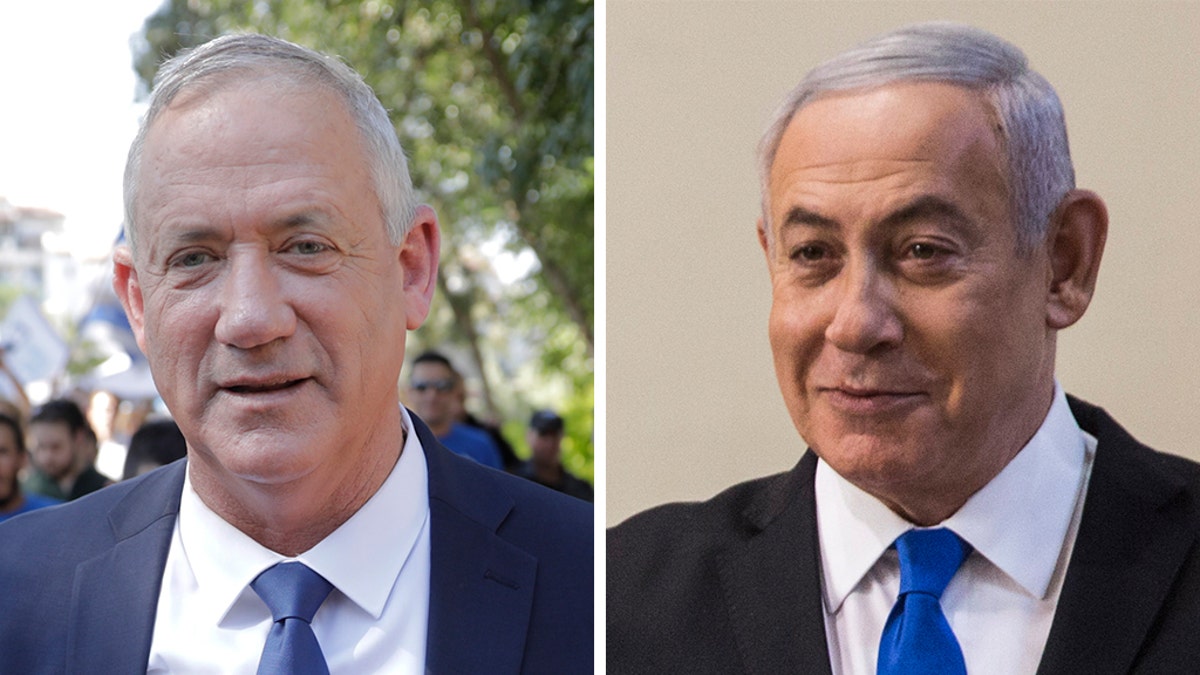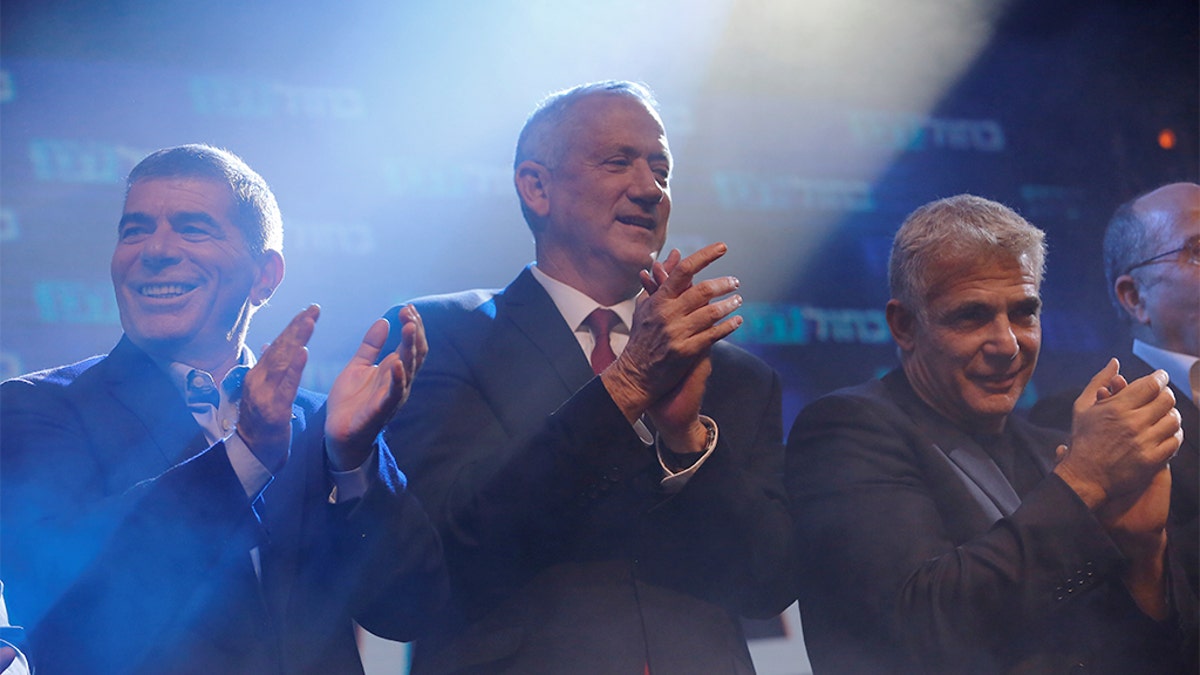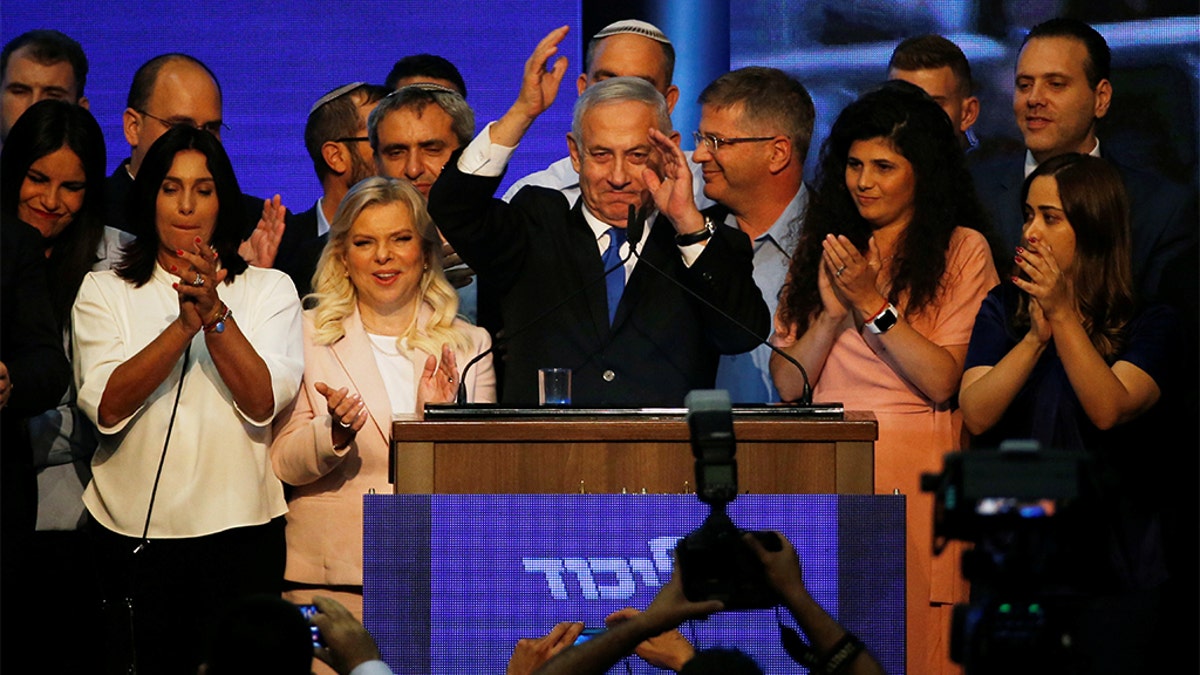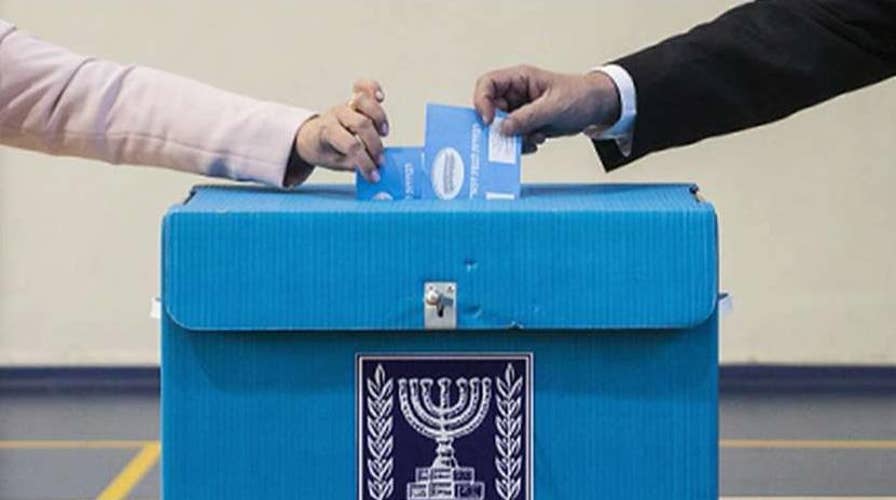Exit polls suggest no clear winner in Israel's general election
Israeli Prime Minister Benjamin Netanyahu appears to have fallen short of securing a parliamentary majority; Trey Yingst reports from Tel Aviv.
Israeli Prime Minister Benjamin Netanyahu's political future was in doubt late Tuesday, as exit polls showed his conservative Likud party and its hard-line allies falling well short of securing a parliamentary majority in the Jewish state's second general election in five months.
The 69-year-old Netanyahu, the longest-serving leader in Israeli history, was seeking a fifth term in office but faced a stiff challenge from Benny Gantz’s centrist Blue and White party.
Exit polls published by Israel's three main television stations early Wednesday projected Blue and White to win 32 seats in the Knesset. Channel 11's poll projected Likud to win 31 seats, Channel 13's projected Likud to win 30 seats and Channel 12's poll projected Likud to win 32 seats. Like Likud, Blue and White and its allies were projected to fall several seats short of the 61 needed to form a coalition, meaning there was no obvious winner in the race.
Channel 13's full exit poll projected the conservative bloc led by Likud to have 53 seats and Blue and White's center-left bloc to hold 44 seats. If the so-called Joint List -- a coalition of Arab-dominated political parties that was projected to take 15 seats -- endorses the center-left bloc led by Ganz, that would put them just two seats short of the 61 needed to command a Knesset majority and likely signal the end of Netanyahu's premiership.
Official results were not expected until sometime Wednesday and the race was still too close to call.
A member of the Blue and White party said that Tuesday’s polls showed “the era of Netanyahu is over,” according to The Times of Israel.
BENJAMIN NETANYAHU'S CAREER ON THE LINE AS ISRAEL VOTES IN REPEAT ELECTION
But Netanyahu supporter Tzachi Hanegbi, a member of the Likud party, reportedly said he was “convinced” that the exit polls were wrong “and Netanyahu will continue to lead us for the next five years."
Former Netanyahu ally-turned-rival Avigdor Liberman's Yisrael Beitenu party was projected to take eight seats by the Channel 13 exit poll, raising the possibility that the prime minister would have to undergo another round of contentious negotiations with Liberman to lay the groundwork for a coalition government.

Exit polls indicated Israel’s Prime Minister Benjamin Netanyahu, right, fell short of securing a parliamentary majority with his hard-line allies in Tuesday’s elections, amid a strong challenge from Benny Gantz's centrist party. (AP, File)
There is also the possibility that Likud, Blue and White, and Yisrael Beitenu form a unity government, but it’s unknown what part Netanyahu would play in that administration. Gantz, a former military chief of staff, has ruled out sitting with a Netanyahu-led Likud at a time when Netanyahu is expected to be indicted on corruption charges in the coming weeks. Further complicating things, Lieberman refuses to sit in any coalition that includes religious parties that traditionally support Netanyahu.
Before the polls closed Tuesday, Liberman reportedly said that he will insist upon a unity government, reiterating his promise to avoid a third election and force a secular unity government between Likud and Blue and White.
"I want to lower everyone's expectations. We aren't going to join a narrow right-wing government or a narrow left-wing government," said Eli Avidar, a member of Yisrael Beitenu.

Blue and White party leader Benny Gantz, center and co-leaders Yair Lapid, right and Gaby Ashkenazi reacting at the party's headquarters early Wednesday. (REUTERS/Corinna Kern)
On Wednesday morning, with polling results showing more optimistic numbers for the centrist Blue and White party compared to April when its leaders prematurely declared victory, the party’s quartet of leaders reportedly laid out a path toward building a coalition while cautiously urging supporters to patiently wait for the final election results.
“Of course we will wait for the real results. But as it looks now, we fulfilled the mission. And more importantly, we did it according to our way,” party leader Gantz told about 200 party supporters in Tel Aviv at around 2:15 a.m., according to The Times of Israel, adding that Gantz did not mention Netanyahu and his Likud party in his speech.
Gantz reportedly added, “We proved that the idea called Blue and White, an initiative that we started a few months ago, is a success, big time, and it’s here to stay.”
The newspaper reported that Gantz already started reaching out to potential allies, including Joint List leader Ayman Odeh, in a bid to start future coalition negotiations.
“I will also speak to [the head of the Yisrael Beytenu party Avigdor] Liberman, I intend to speak to everyone,” the paper reported Gantz told supporters. “Starting tonight, we will start work on building a broad national unity government.”

Israeli Prime Minister Benjamin Netanyahu gesturing to supporters at his Likud party headquarters early Wednesday. (REUTERS/Ronen Zvulun)
Meanwhile, Netanyahu reportedly told his supporters on Wednesday morning, “We’re still waiting for the results. But one thing is clear, the State of Israel is at a historic turning point. We are facing immense opportunities, and immense challenges… including the existential threat from Iran.”
He also brought up the fact that the Trump administration will soon unveil its Middle East peace plan, according to The Times of Israel.
The newspaper reported Netanyahu also said that he had spoken to his prospective coalition partners, who all stand with him, and will soon start negotiations to create a “strong Zionist government” as well as prevent the formation of a “dangerous anti-Zionist” government.
“We will protect this country,” he reportedly added.
Liberman, a former defense minister, forced Tuesday's election when he refused to join Netanyahu's coalition government after April’s vote. Netanyahu appeared to have won another term in April, as the conservative and nationalist bloc won the most seats in the Knesset, but Liberman refused to join the new coalition.
When Netanyahu failed to form a government in the allotted time frame he pushed through a vote to dissolve the Israeli parliament and call for new elections rather than allow Ganz the opportunity to form a governing coalition.
Throughout the campaign Netanyahu had tried to portray himself as an experienced leader with close ties to President Trump, while Gantz tried to depict Netanyahu as scandal-plagued, offering himself as an honest alternative.
Netanyahu had sought to secure a majority with his allies in an attempt to get immunity from an expected indictment on corruption charges.
He appeared desperate to secure a narrow 61-seat majority in parliament with his hard-line religious and nationalist allies, who are expected to approve legislation which would grant him immunity from prosecution.
Israel’s attorney general had recommended pressing criminal charges against Netanyahu in three corruption cases, pending a long-delayed pre-trial hearing scheduled for next month. Without immunity, Netanyahu would likely feel pressured to step aside.
“We will bring hope, we will bring change, without corruption, without extremism,” Gantz said early Tuesday.
When asked if Gantz would consider a rotation deal with Netanyahu, where Gantz would serve as prime minister for two years followed by the Likud leader, Gantz spokeswoman Melody Sucharewicz told The Times of Israel: “Our goal is clear, and nothing has changed: to build a stable, secular national unity government, without Netanyahu.
Netanyahu predicted on Tuesday morning that the vote would be “very close” and begged supporters to get out the vote in a series of messages throughout the day.
The voter turnout Tuesday was reportedly higher than in the election five months before. The final figure when polls closed at 10 p.m. Tuesday was 69.4 percent, a one-percentage-point increase from the previous election in April, but lower than the 72.36 percent turnout in 2015, according to Israel's Central Elections Committee.
Several small parties fighting to squeak past the minimum 3.25 percent threshold to enter Israeli parliament could also determine Netanyahu’s future, with the performances of those parties potentially able to define Netanyahu’s ability to form a coalition.
CLICK HERE FOR THE FOX NEWS APP
Once the official results are announced, Israel President Reuven Rivlin will select the candidate he believes has the best chance of forming a stable coalition. Rivlin is expected to consult with all parties in the coming days before making his decision.
Rivlin’s choice will have up to six weeks to form a government and if that person fails, the president can appoint another candidate, who will get up to four weeks.
The Associated Press contributed to this report.
